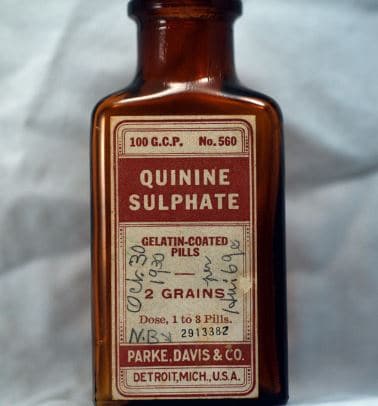Last post briefly reviewed quinine’s colorful and deadly history. It’s the oldest and most drug-resistant malarial treatment, also the most readily available, least expensive, and most dreadful. It was the single cure for malaria until World War II, when malaria wreaked havoc on US soldiers in the Pacific theater of operations and the search for new, better drugs became urgent.
Today is part 2 of the quinine story. It describes the quinine course of treatment and effects on malaria, hearing and the vestibular system.
Cinchonism — The Curve of a Cure
Quinine’s constellation of harsh side effects are collectively diagnosed as cinchonism. Cinchonism is itself a pathology and in its severe form it can bring on even more pathology or death. Mild chichonism can occur with therapeutic doses of quinine, so those who are treated for malaria with quinine have a good chance of coming down with this additional pathology in the course of treatment.
Cinchonism is characterized as “mild” or “severe” depending on symptoms. Audiovestibular symptoms are highlighted in red.
Mild Cinchonism Symptoms
- flushed/sweaty skin
- tinnitus
- blurred vision
- hearing loss (usually reversible, high frequency)
- confusion
- headache
- abdominal pain
- rashes
- autoimmune reaction (lichenoid reaction)
- vertigo, dizziness
- mood disorders (depression, dysphoria)
- nausea
- vomiting
- diarrhea
Severe Cinchonism Symptoms
- skin rashes
- deafness (usually reversible)
- extreme sleepiness (condition called “somnolence”)
- vision loss or blindness
- anaphylactic shock
- cardiac toxicity including death
- autoimmune reaction known as blackwater fever, which brings on renal failure and often death
The Audiologic View
None of this is good news. The best decision is to avoid malaria at all costs. That is not always practical or possible and malaria is not going away. At some point in their professional careers, Audiologists will encounter those who are or have experienced malarial effects, whether by disease or anti-malarial drug effects. Pediatric Audiologists will encounter infants born to mothers who had malaria and malarial treatments.
What are we to do when this happens? There is little guidance in our literature. Next week is my small, untested, set of suggestions for an audiologic protocol for such encounters with malaria and its treatments.






